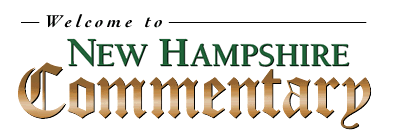

By Frederick Smith, Headmaster Emeritus, New Hampton School, New Hampton, NH
Long John Wentworth’s Advice Paved the Way for Lincoln’s Nomination in Chicago
From the time I entered New Hampton School in September, 1906, I had heard about the fabulous Long John Wentworth who had been raised in nearby Sandwich, N. H., graduated from New Hampton in 1831 and founded the Social Fraternity, a literary society very important to New Hampton history. So when my son Rob* gave me as a Christmas present Bruce Catton’s great book about the background of the Civil War, The Coming Fury, Wentworth’s name fairly leaped from page 51.
After New Hampton, Wentworth taught school for a year, went on to Dartmouth and graduated there in 1836, went on to Detroit with the idea of teaching school. Since he did not find employment in Detroit, he sent his trunk by boat to Chicago, rode by stagecoach to Michigan City and walked the beach to Chicago.
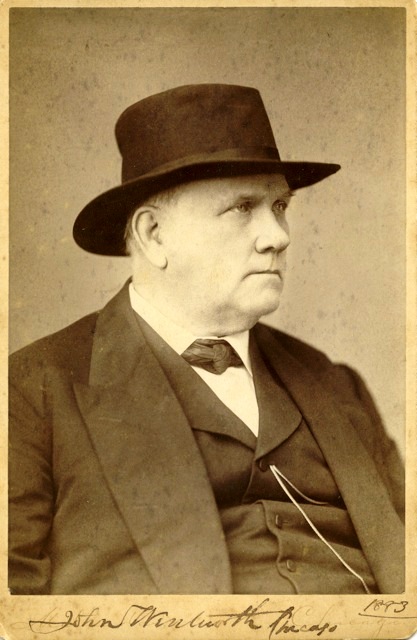
"Long" John Wentworth (1815-1888) of Sandwich, NH, 16th Mayor of Chicago.
Wentworth entered newspaper work and soon became owner of the Daily Democrat, and made it for years the leading paper in the Northwest. In 1843, when 28 years of age, he was elected to the House of Representatives of the 28th Congress, the youngest member of that body. On the repeal of the Missouri Compromise Wentworth left the Democratic Party and joined with those of moderate anti-slavery views who founded the Republican Party. While in Congress in his second term he had been a friend and colleague of a fellow Illinoisian, Abraham Lincoln (New Hampshire’s Amos Tuck, served also in this Congress – ed). Both were to bulk large in the development of the Northwest and the United States.
According to a notation about Wentworth in the Dictionary of American Biography, Scribners (page 659): "He was elected mayor of Chicago in 1857 on the Republican fusion ticket and announced he would take no salary. He introduced the first steam fire engine and the first fire department of the city. He served several terms as mayor of Chicago and in Congress. Six foot six and three hundred pounds…the anecdote was widely told, published and believed that once when running for mayor he walked out of the courthouse steps and faced a waiting crowd that let out a tumultuous yell of greeting. He looked in calm scorn at them, not taking his hat off, and then delivered the shortest most terrifying stump speech ever heard in Illinois: ‘You damn fools…you can either vote for me for mayor or go to Hell!…’ His death called for a remarkable series of commentaries and reminiscences on a figure that had striven with the generations who found Chicago a swamp and a mudhole and saw it made into an audacious metropolis."
Regarding the connection between Lincoln and Long John Wentworth, and Lincoln’s nomination for president instead of William Seward by the Republican Party in 1860: Seward’s campaign for the nomination was being so well managed by Thurlow Weed that it was almost a foregone conclusion that Seward would win on the first ballot at the Chicago convention.
Bruce Catton notes: "Seward’s position was weaker than either he or Weed realized, and there were in Chicago men who had diagnosed its weakness…The most effective of these were buzzing in and out of a set of rooms at the Tremont Hotel, where a fat down-state lawyer, David Davis, had set up headquarters for Abraham Lincoln.
"Davis had known Lincoln ever since the old circuit-riding days and when Long John Wentworth, the Republican mayor of Chicago advised Lincoln that ‘you ought to have a feller to run you like Seward has Weed,’ Lincoln had chosen Davis."
The second reference to Wentworth in "The Coming Fury" is on page 54: "Mayor Wentworth had warned Lincoln to ‘look out for prominence.’ The convention would finally realize Wentworth said, that a really prominent candidate could not be chosen; then the man who had avoided prominence would have his chance. Now the Lincoln managers were trying as hard as they could to keep their man out of the limelight and at the same time set men to thinking about him; he was a dark horse, and for the moment he must stay dark, but he must never become so dark as to be lost to view. The job called for expert handling. Expert handling it was getting."
The rest is history. Davis managed the Lincoln campaign well and made deals that Lincoln himself would never have made. And so the advice of one of New Hampton School’s most famous and colorful graduates and his tremendous influence in the then young Northwest were of great importance in a time of a great crisis in our country. On a sad note, Wentworth helped carry the assassinated president’s coffin when Lincoln’s funeral train stopped in Chicago to lie in state at the Chicago Courthouse.
Further background material on Long John Wentworth, 16th mayor of Chicago, may be found in "Chicago Giant, a biography of Long John Wentworth’" by Don E. Fehrenbacher, published by The American Research Center, Madison, Wisconsin 1957.
New England Historical Society profile of John Wentworth here.
*(Robinson V. Smith, New Hampton ’42, Dartmouth ’46)
_____________________________________________________________
Governor Frederick Smyth Introduced Lincoln As ‘Next President’
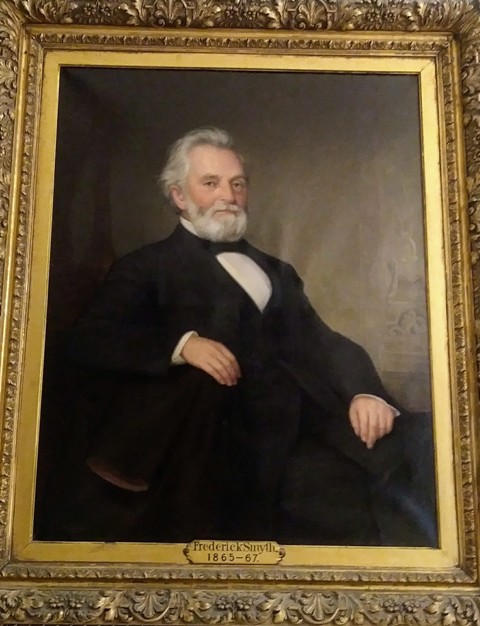
Mayor of Manchester and NH Governor Frederick Smyth (1819-1899), State House portrait
Percey Coe Eggleston in his slender volume of 36 pages "Lincoln in New England," gives great emphasis to Abraham Lincoln’s two visits to New England. The first of these was in 1848. "What wonder that in this region he gave importance to the free-soil movement and gauged the widening breach between the northern belief that slavery was evil and unendurable and the southern claim that it was divine and necessary. Such men as Sumner, Garrison, Whittier, Lowell, Emerson, Palfrey, Heal, and Adams were already in the field, and Massachusetts was quivering under their impassioned protests."
This exposure to New England thinking in 1848 must have had a profound influence on the future president.
When I was a boy on a farm in Meredith Center (New Hampshire), five miles from New Hampton, I used to hotly resent the nickname the hired men applied to me: "Governor." The "Governor" was bad enough, but when they varied it with "Governor Do-Little" and "Governor Do-Nothing," I failed to see the humor of it.
The reason for this repugnant, to me, nickname was that I was named for Governor Frederick Smyth,* my grandfather’s first cousin who became mayor of Manchester (three terms), N. H. Governor (two terms), founder of banks and railroads, a member of the executive committee of the United States Agricultural Society, and influential in bringing Lincoln to New Hampshire in 1860 as chairman of Manchester’s Republican club.
Governor Frederick Smyth did not attend New Hampton School. Beyond the common schools, his only education was a term at Phillips Andover Academy to which he walked, and then returned home to earn more money to return to Andover. He never returned after the one term. He walked from his home in Candia to Manchester, found a job, and became an important state and national figure.
On page 12 of Eggleston’s book appears this about Smyth: "Manchester is the only place in New England that held a dreamer so bold as to publicly introduce Lincoln as the next president of the United States." Smyth introduced Lincoln thusly at a packed auditorium at Smyth Hall, the future governor’s imposing commercial building on Manchester’s Elm Street.
Although Governor Smyth did not attend New Hampton, he was a member of the Board of Trustees for some years and so New Hampton claims him as one of the three who had great weight in the nomination of Abraham Lincoln to the presidency.
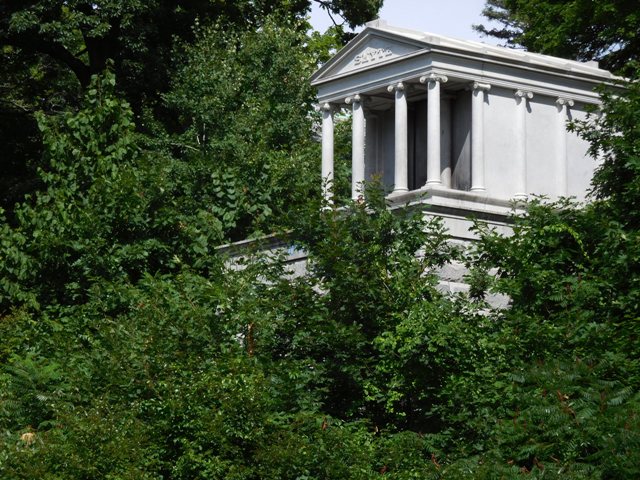
Governor Frederick Smyth mausoleum, Valley Street Cemetery, Manchester, NH
*Governor Smyth changed the spelling of his name from Smith to avoid confusion with a contemporary of the same name, according to his biographers.
_____________________________________________________________
George Gilman Fogg Helped Found GOP and Elect Lincoln
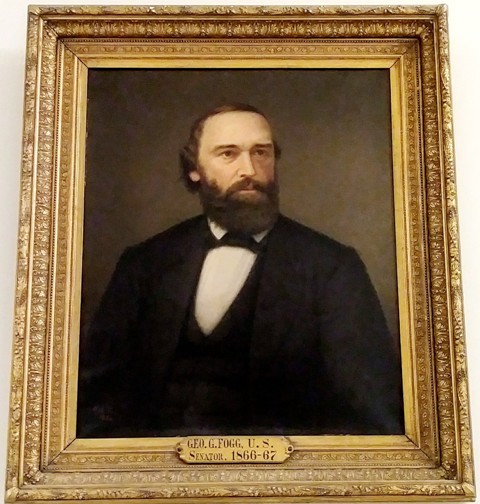
Newspaper Publisher, U. S. Senator, NH Secretary of State, and Minister to Switzerland, George Gilman Fogg (1813-1881), State House portrait..
George Gilman Fogg was born and raised in Meredith Center, N. H, the same village where I grew up on a farm. The schools of Meredith Village, several miles away, ran 20 weeks each year, but the Meredith Center school had an extra five weeks from the proceeds of the Fogg Fund. At that time this did not seem to us an unmixed blessing. While kids in other parts of town were out skating, sliding, making maple syrup, fishing through the ice, and otherwise enjoying themselves, we were doing an extra five weeks of school.
In retrospect, however, the Fogg fund was a fine contribution of a great man to the section of the town of Meredith in which he was raised.
George Gilman Fogg, lawyer, editor, diplomat, attended New Hampton School (Class of 1835), graduated from Dartmouth in 1839, studied law at Harvard and in the office of Judge Warren Lovell in Meredith Village, and began practice in Gilmanton Iron Works in 1842. After four years he moved to Concord and maintained a residence there on Main Street for the rest of his life. He never married.
Fogg was active in politics, being a pioneer in the Free-Soil movement, and in 1846 was chosen as N. H. secretary of state for one year. A few years later he took an active part in the organization of the Republican Party in Exeter, N. H. with former Congressman Amos Tuck, his long-time friend. Fogg was also the founder of the Independent Democrat of Concord, and from 1846 to 1861 devoted himself largely to journalism. Under his direction the newspaper became one of the most influential in the state, and his editorial utterances were widely quoted throughout New England and in the New York press.
As a delegate to the Republican convention of 1860, he was a strong supporter of Abraham Lincoln and in 1861, Lincoln appointed him Minister to Switzerland.
It is interesting to note that after his return from Switzerland, Fogg was appointed by his cousin, Governor Frederick Smyth, to fill out the unexpired term of Daniel Clark in the United States Senate in 1866 when Clark was appointed U. S. District Judge.
George Gilman Fogg and Governor Frederick Smyth were very instrumental in bringing Lincoln to New Hampshire for his second visit in 1860. The fact that New England gave all its electoral votes to Lincoln in both the elections of 1860 and 1864 attests to the foresight of these two New Hampton and New Hampshire men, along with the leaders of the other New England states, in their support for the nomination and election of the "rail splitter" from Illinois.
New Hampton School is proud of this trio: Long John Wentworth, New Hampton 1831, Governor Frederick Smyth, New Hampton trustee, George Gilman Fogg, New Hampton 1835, all of whom did so much to elevate Abraham Lincoln to leadership in a time of great crisis in the history of the United States.
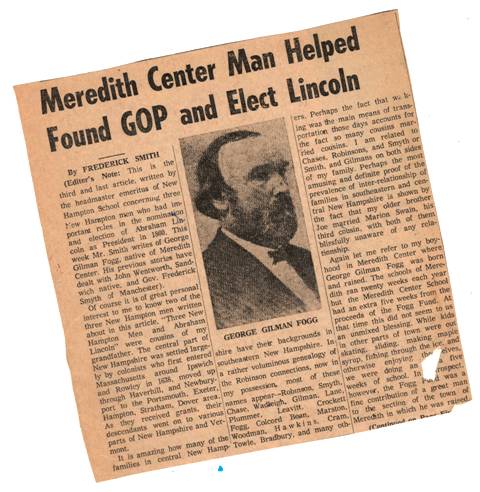
This piece is based on a series of three articles by the late Frederick Smith (New Hampton '10) which appeared in the Laconia Evening Citizen in February, 1964. Mr. Smith served as headmaster of New Hampton School, New Hampton, N. H. from 1926 to 1959, and as headmaster emeritus from 1959 until his death in June of 1976. The portrait below of Mr. Smith and his wife, Grace Vohr Smith, is an oil on canvas by Joan Trimble Smith (Mrs. Robinson V.)** and is displayed in the school's Academic Research Center. Mr. and Mrs. Smith, as a celebrated team, have been called the "rebuilders" of New Hampton School. They are credited with instituting strategies saving New Hampton School from ruin during the years of the Great Depression, then guiding it through the changes private secondary education underwent in the United States during the Second World War and after.
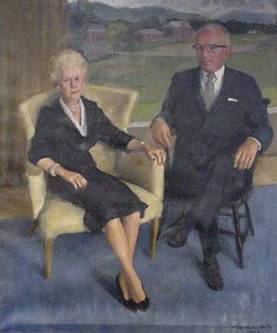
**The works of Joan Trimble Smith (1925- 2002), include a portrait of Associate Justice Nathan Clifford, a New Hampton alumnus born in Rumney, NH, which hangs in the U.S. Supreme Court building, Washington. Also her portrait of Dr. Robinson W. Smith, New Hampshire's first state veterinarian, is displayed at the Smith Diagnostic Laboratory at the University of New Hampshire, at Durham.
*The connection: Frederick Smith's grandfather, Daniel Pike Smith of Meredith, was first cousin to Governor Joseph Smyth (born Smith) of Manchester, late of Candia, NH. because Daniel Pike Smith's father was Joseph Chase Smith of Meredith, brother to Stephen Smith of Candia, father of the governor.
© 2003 NH Commentary
P.O. Box 706
Concord, NH 03302